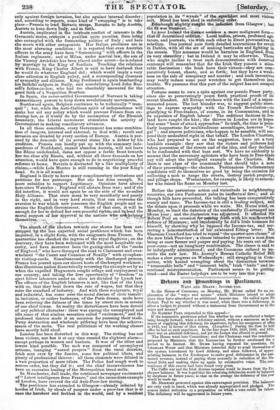The march of the cholera towards our shores has been
out- stripped by( the less expected social pestilence which has been imported, in a slight fOrm, with the emigrants from France. No quarantine has checked the ingress of the royal fugitives • on the contrary, they have been welcomed With the most hospitable sin- cerity, and have moreover been the gazing-stock of the "snobs of England," who have thronged the road to Claremont and over- whelmed the Count and Countess of Neuilly " with sycophan- tic visiting-cards, Simultaneously with the discharged princes, France has poured upon our shores hosts of discharged workmen ; that illustrious nation diametrically reversing the example set by us when the expelled Huguenots sought refuge and employment in our country, and taking the first opportunity of "freedom" to eject fellow labourers under an alien act dictated by Lynoh law. The offence of the English labourers is not, like that of the Irish with us, that they beat down the rate of wages, but that they raise the standard of industry. And with these emigrants, royal and industrial, has come over the social disease of civic tumult: in imitation, or rather burlesque, of the Paris drama, mobs have been relieving the dulness of the times by street riots in several of our chief towns. In reality the disturbances have been devoid of any political character: there was among the unemployed and idle some of that aimless sensation called "excitement," and the professed thieves made it an occasion for pursuing their trade. Petty destruction and wholesale pilfering have been the achieve- ments of the mobs. The real politicians of the working classes have mostly held aloof. London has been disturbed in this way. The rioting has not been violent, nor has it at any time created the slightest alarm— except perhaps in women and bankers. It was of the idlest and lowest kind possible. The mob was composed of unemployed artisans, lounging "casual paupers" from the rural districts, Irish sent over by the famine, some few political idiots, and plenty of professional thieves : all these elements were diluted in a vast proportion of mere idlers. The Police had rough work to restore order, but they did it ; and the chief inconvenience has been an excessive loading of the Metropolitan tread-mills. In Manchester, dull trade, the continued newspaper excitement of" Latest intelligence from France," and the immediate example of London, have revived the old Anti-Poor-law rioting. The pestilence has extended to Glasgow—already infected by hordes of Irish, by shoals of paupers under a poor-law that is at once the harshest and feeblest in the world, and by a resident population in its " vrynds" of the squalidest and most vicious sort. Blood has been shed in enforcing order.
Edinburgh slightly caught the infection from Glasgow ; but the fit was transient.
In poor Ireland the disease assumes a more malignant form-- that of determined sedition. Local bodies, priests, professed agi. tators, and journals, vie-with each other in direct provocatives to rebellion. One journal puts forth detailed instructions for revolt in Dublin, with all the art of making barricades and fighting in the streets. This nonsense would be harmless in England, from its very absurdity ;. but in Ireland it may be otherwise. Those who might incline to treat such demonstrations with deserved contempt will remember that for the Irish they possess a mise- rable fascination : the Irish have their virtues—they are com- paratively honest, chaste, and so forth; but they have a weak- ness on the side of conspiracy and murder ; and such incentives may really induce some poor wretches to get themselves into trouble. We presume that this part of the subject has not escaped attention.
Fortune seems to own a spite against our pseudo Peace party, since she so perseveringly pours forth practical proofs of its recent blunders. All Europe reechoes with the knell of a super- annuated peace. The last blunder was, to suggest public meet- ings to express sympathy with the French Revolution—so gratifying to Free-traders, of course in its Communism, and in its expulsion of English labour ! The seditious factions in Ire- land have caught the hint; the thieves in London are in hopes that some "hour of attack approaches." In truth, the time iii-pecu- liarly inopportune for multitudinous assemblages, however "le- gal " ; and sincere politicians, who happen to be sensible' will sus- pend their undoubted right in that behalf. The London Chartists, who had prepared to act on the suggestion, have set a very laudable example : they saw that the rioters and pilferers had taken possession of the streets and of the idea, and they declined to be confounded with that base sort. We have no authority to assume that the mercenary agitators who have been in Free-trade pay will adopt the intelligent example of the Chartists. But there is one class of the community that should take a note of these proceedings—the electors. Pertinacious Parliamentary candidates will do themselves no good by being the occasion for collecting a mob to range the streets, destroy parish property, and pillage shops. Westminster, for example, is likely to remem- ber who raised the flame on Monday last.


























 Previous page
Previous page